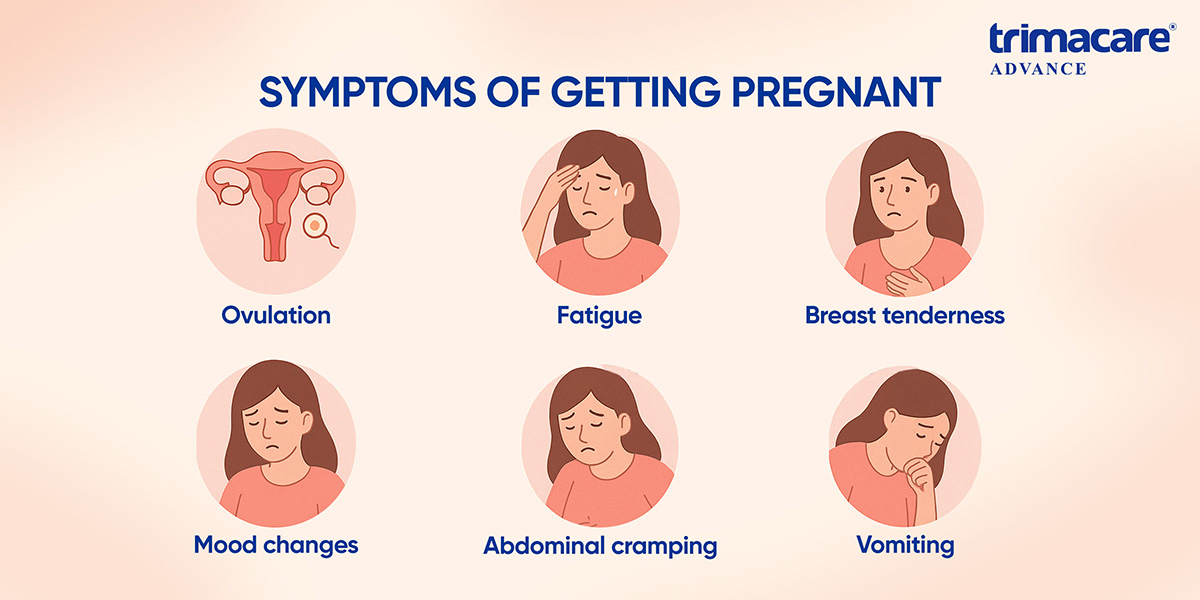Is the question ‘How I will know that I am pregnant?’ striking your mind? Then you are not alone. Pregnancy is a wonderful, adventurous journey that starts with a spark of life. Your body starts sending you subtle signs that indicate a pregnancy before your pregnancy test or a visit to your gynaecologist confirms it.
Knowing these changes, which range from morning sickness to signs of ovulation, helps you identify the early symptoms of getting pregnant and take early charge of your health.
Due to the prevalent nutritional deficiencies in iron, folate and vitamin B12, it is more crucial for Indian women to get this awareness. That’s where Trimacare plays a vital role. Trimacare is a comprehensive pregnancy supplement that helps with all trimesters of pregnancy, from ovulation symptoms, trying to conceive, to postpartum recovery.
From Ovulation to Early Pregnancy: Basic Understanding
Symptoms of pregnancy: From ovulation to vomiting
Let’s see what are the symptoms of getting pregnant-
- Missed periods- Missed periods are the first sign of pregnancy for women who become pregnant. This occurs after the sperm and egg have fully fertilised and the body begins to create hCG (human chorionic gonadotropin), a hormone that is produced in the placenta 8–10 days after conception to support the growth of the foetus.
- Frequent urination- After the periods are missed, one of the early pregnancy signs that might be noticed is frequent urination. Urination becomes more frequent during pregnancy because the body produces more blood and fluid to support the growing fetus. This puts strain on the kidneys to filter larger quantities of blood and eliminate waste items in the urine.
- Light spotting and implantation bleeding- This generally happens in 6-12 days after ovulation when the egg attaches to the uterine lining and causes bleeding.
- Mild abdominal cramps- One of the earliest indications of pregnancy is cramping, which happens in one to two weeks after fertilisation. Like menstruation cramps (dysmenorrhea), there will be pain, acute pain, or cramping in the lower abdomen close to the uterus. This is caused by the baby’s accelerated production of hormones to support the developing embryo and the expansion of the uterus in tandem with the baby’s growth.
- Breast tenderness, swelling or breast changes- Breast tenderness is one of the most common symptoms of getting pregnant that is visible two to three days after fertilisation. The sensations will resemble those that occur before menstruation, which include breast tingling and a feeling of fullness.
- Fatigue- Feeling tired for no reason? It is because your body’s progesterone level is increased, and it will make you feel drained or sleepy.
These are some general pregnancy symptoms, day after ovulation, often before you miss your period.
Morning Sickness- When does it occur?
Are you curious to know when will the morning sickness start or when vomiting will start in pregnancy? Many pregnant women start feeling queasy around the fifth or sixth week. Whereas, some women experience nausea as soon as a few days after ovulation.
So, in pregnancy, when vomiting starts usually depends on your body during the first month. Morning sickness can cause food aversions and increased senses. One of the main symptoms is a sudden dislike of a particular food or smell. Nausea when pregnant causes hormonal changes or lightheadedness, which may lead to low blood sugar.
Detailed Week-By-Week Timeline
Early pregnancy symptoms can vary, but here is a general timeline of what to know, week by week:
| Timeline | Symptoms |
| Ovulation (day 14) | Cramping, tender breasts, mood change |
| 4-7 days after ovulation | Implantation bleeding, mild cramps- pregnancy symptoms day after day |
| 2 Weeks after ovulation | Missed period, breast tenderness, fatigue |
| 3-4 weeks after ovulation | Vomiting, morning sickness, food aversions and cravings |
What are the seven Ovulation Signs which you must not ignore?
You should know what are the seven ovulation signs, you must not ignore them before considering pregnancy symptoms. This is because knowing when you ovulate improves your chances of becoming pregnant and helps you track symptoms early.
These ovulation signs are-
- Increased cervical mucus
- Light spotting
- Breast tenderness
- Increased sense of smell
- Mild pelvic or abdominal pain
- Change in body temperature
- Increased sex drive
When you know you have ovulated, you can keep a check on pregnancy symptoms the day after ovulation.
Role of supplements and nutrition
Proper nutrition is essential even before your pregnancy is confirmed. Neural tube and brain development begin early, making nutrients like folate, iron, and B12 essential.
However, Indian women are often deficient in:
- Iron: Leading to fatigue and anaemia
- Folate and Vitamin B12: Vital for brain and spinal cord development
- Vitamin D and Calcium: Crucial for bone growth and immunity
How Trimacare pregnancy supplement helps-
Trimacare prenatal vitamins is especially designed for Indian women, which effectively helps early symptoms and stages of pregnancy. Here are some important benefits of using Trimacare-
- Contains 20+ essential elements including folate, Iron, DHA, B6, B12 and more.
- Formulated to provide trimester-wise nutrition
- Contains vitamin B6, which reduces nausea during pregnancy.
- Contains time-release iron that prevents digestive issues such as bloating and constipation.
- Supports brain, neural and organ development
- Improves immunity and supports postpartum recovery
Special features of the Trimacare prenatal multivitamin
- 100% vegetarian
- One pill solution
- Scientifically developed under the guidelines of WHO and ICMR
- Recommended by leading gynaecologists
- Has no side effects, safe for pregnancy and the postpartum period
FAQs
Q1. What signs indicate a pregnancy?
These signs include mood swings, nausea, spotting, breast tenderness, and exhaustion throughout pregnancy.
Q2. When do symptoms of pregnancy start to appear?
After 1-2 weeks of ovulation, most women experience symptoms like fatigue or cramping.
Q3. When does pregnancy-related back pain begin?
As early as the first few weeks of pregnancy, and perhaps even before a missing period, back pain can begin. It happens due to the release of relaxin, which a hormone that relaxes ligaments to get your body ready for pregnancy. During weeks four and six, many women have mild pain in the back. As the baby grows and posture changes during the second and third trimesters, this pain may persist or worsen.
Q4. Is vomiting mandatory in the first trimester?
In the early stages of pregnancy, vomiting is not necessary. Not all pregnant women will throw up, but many do, especially during the first trimester. While some people may experience mild nausea, others may not experience any nausea at all. Since every pregnancy is unique, the lack of vomiting does not necessarily mean that there is a problem with the pregnancy.
Q5. Is Trimacare suitable for every trimester?
Indeed, Trimacare is made specifically for each of the three stages of pregnancy. It is available in a formulation that is tailored to each trimester to accommodate the mother’s and baby’s increasing nutritional demands. Folate, iron, omega-3 (DHA), calcium, vitamin B6, and other vital nutrients are incorporated into each stage (Trimacare 1, 2, and 3) to support foetal growth and maternal immunity.
Q6. Can Trimacare alleviate nausea?
Yes, Trimacare has anti-emetic herbs and vitamin B6 to help with pregnancy-related nausea and other discomforts.
Q7. What are the seven ovulation indicators?
Mild pelvic pain, elevated cervical mucus, breast sensitivity, increased libido, mild bloating, spotting, and a modest increase in body temperature are among seven ovulation indicators.
A Certified Nutritionist with a rich healthcare background in health journalism, the author has immense experience in curating reader-friendly, engaging, and informative healthcare blogs to empower readers to make informed pregnancy-related decisions.












